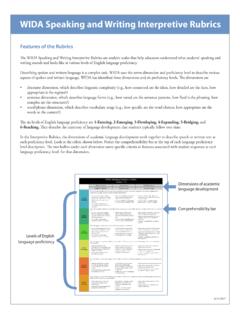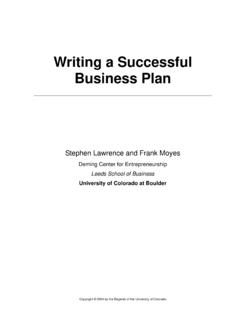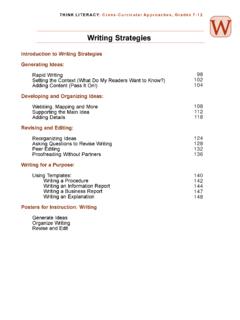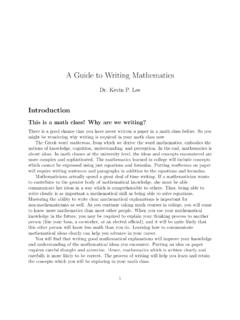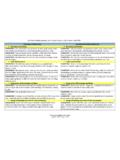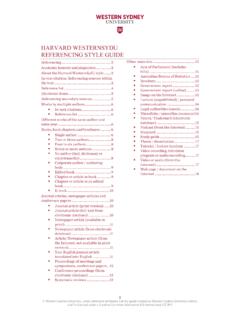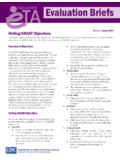Transcription of GF GUIDE TO BUSINESS REPORT WRITING APPENDIX G
1 G. F GUIDE TO BUSINESS REPORT WRITING . APPENDIX G. APPENDIX G - GUIDE TO BUSINESS REPORT WRITING . PURPOSE OF BUSINESS REPORTS. ALAN THOMPSON. 2005. A BUSINESS REPORT conveys information to assist in BUSINESS decision-making. The BUSINESS REPORT is the medium in which to present this information. Some reports might present the actual solution to solve a BUSINESS problem; other reports might record past BUSINESS information that is used toward future BUSINESS planning. More traditional reports, such as BUSINESS Plans, serve to communicate the BUSINESS Concept, BUSINESS management model, commercial objectives, operational procedures and the perceived viability of the enterprise.
2 Many people consider BUSINESS reports as dry, uninteresting documents which take a great deal of time and effort to prepare. The reality is that they are an essential part of doing BUSINESS and one's ability to be proficient in this area is critical to the ability to pursue commercial success (McCarthy 1979;. Ronstadt 1984; Thompson 2003c). Although much of the research and analysis that supports the BUSINESS REPORT is derived from a systematic process, the actual THE ART OF SUCCESSFUL BUSINESS START-UPS AND BUSINESS PLANNING. preparation of the REPORT is more reliant on art than on a proven BUSINESS template. Although for most BUSINESS reports templates are readily available, they are only a GUIDE and the reports 163.
3 ENTREPRENEURSHIP AND BUSINESS INNOVATION. needs to be developed to best fit their intended application. In order for the reader to have a clear understanding of why a REPORT is written, a written purpose theme must exist through the REPORT . This theme could be represented as either a statement or a question. In generating a BUSINESS REPORT , the following steps should be considered: BUSINESS . Determine the scope (purpose) of the REPORT , Consider the target audience (readers), Gather and organise the supporting information (research), AND. Analyse, and weigh the supporting information, ENTREPRENEURSHIP. Determine the solution, findings and/or recommendations, and Determine the REPORT format.
4 G 2005. ALAN THOMPSON. GUIDE TO BUSINESS REPORT WRITING . APPENDIX G. DETERMINE THE SCOPE OF THE REPORT . A frequent mistake of many BUSINESS reports is that the author makes the scope (purpose) of a REPORT too general or vague. As most BUSINESS reports are required to support specific organisational objectives, strategies and decision making it is critical that a chain of continuity in argument and evidence can be demonstrated between the purpose of the REPORT , the research, and ultimately the solutions, findings or recommendations. The stronger this continuity the greater the weight the REPORT will have in supporting the decision making process.
5 When you choose a focus for a REPORT , one of the first steps is to narrow the scope to a REPORT length. The scope of the REPORT is defined by determining the factors which will be studied. CONSIDER THE TARGET AUDIENCE. Always consider the BUSINESS reports alignment with the THE ART OF SUCCESSFUL BUSINESS START-UPS AND BUSINESS PLANNING. intended audience. BUSINESS reports usually have a number of different audience groups to reach so a REPORT will often have a hierarchical structure to support different levels of detail. Many 164. ENTREPRENEURSHIP AND BUSINESS INNOVATION. people may be involved in a decision-making process and they will have different levels of information requirements to support their decisions making process.
6 In designing the REPORT format and style the following target audience characteristics should be considered: Their need for the REPORT ( finance approval, BUSINESS . operational planning, resource allocation), Education level ( their ability to understand and rationalise the document), Position in the organisation ( authority for AND. information contained in the document), Knowledge of the REPORT 's topic ( purpose), ENTREPRENEURSHIP. Responsibility or authority to make decisions based on the REPORT , and Personal demographics ( age, biases, alliances, attitudes). G 2005. ALAN THOMPSON. GUIDE TO BUSINESS REPORT WRITING .
7 APPENDIX G. To avoid making false assumptions about the target audience the author should compile a list of all the intended readers and develop a profile of them. Audiences are basically of three kinds: Primary Audience - People who have to make decisions on the basis of the BUSINESS REPORT , Secondary Audience - People who are affected by the actions the primary audiences would take in response to the position of the BUSINESS REPORT , and Immediate Audience - People responsible for examining the BUSINESS REPORT , weighing its viability and distributing the REPORT to a broader audience. THE ART OF SUCCESSFUL BUSINESS START-UPS AND BUSINESS PLANNING.
8 In determining if a number of versions of reports are required 165. ENTREPRENEURSHIP AND BUSINESS INNOVATION. with varying levels of evidence, the author should consider the following audience decision making needs: How much background (supporting factual data, analytical findings, solutions, and recommendations) will the audience need? BUSINESS . Do they need to define any terms being used within the REPORT (if so ensure they are included in a Explanation of Terms or Glossary)? What language (technical complexity) level will be most appropriate for the target audience? AND. How many and what kind of visual aids should be used for the target audience?
9 ENTREPRENEURSHIP. What will the target audiences expect from the BUSINESS REPORT ? Does the reader prefer everything given in detail or merely a brief presentation that touches upon the highlights? G 2005. ALAN THOMPSON. GUIDE TO BUSINESS REPORT WRITING . APPENDIX G. GATHER AND ORGANISE THE SUPPORTING. INFORMATION. Now that the REPORT 's author has a clear understanding of the purpose and scope of the BUSINESS REPORT and who the target audience is, he is now ready to gather and organise the research and data collection. BUSINESS research and analysis provide information to facilitate operational planning, production planning, supply chain management, quality systems and investment strategy development.
10 The research issues that are most decisive in this area include customer activity and behaviour, market and economic conditions, competitive considerations and BUSINESS strategies in response to the market place (Richardson 1989; Gofton 1997; Thompson 2003a). Market research always involves some form of data collection. This can occur from a primary data level, whereby the researcher collects data first hand from consumers, or from secondary data through investigative research. Primary research data refers to THE ART OF SUCCESSFUL BUSINESS START-UPS AND BUSINESS PLANNING. data obtained from the original source regardless of whether that data was generated in a laboratory or out in the field.


